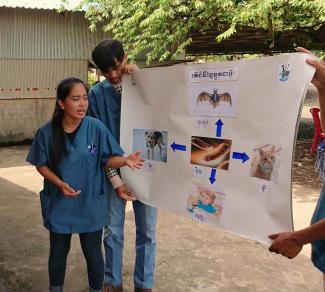The USAID One Health Workforce – Next Generation (OHW-NG) project empowers One Health University Networks to develop and deliver model programs that equip professionals with the transdisciplinary skills needed to address complex global health issues. Since 2011 in partnership with USAID, the Southeast Asia One Health University Network (SEAOHUN) has worked to develop a resilient and robust One Health workforce to prevent, detect, and respond to infectious disease threats – now and for generations to come.
Southeast Asia is a dynamic region characterized by steady economic growth, swelling populations, and rich biodiversity, all of which are recognized drivers of emerging infectious disease risk. The region is no stranger to emerging infectious diseases and zoonotic disease outbreaks, including Nipah virus, Severe Acute Respiratory Syndrome (SARS) coronavirus, highly pathogenic avian influenza, and other zoonotic influenza viruses, including the pandemic 2009 influenza virus. SARS-CoV-2 and the ongoing COVID pandemic is yet another example of the devastating impact these emerging disease threats pose to the health and stability of our global community.
EXPANDING THE REGIONAL UNIVERSITY NETWORK
SEAOHUN, established in late 2011, is a leading regional network of 92 universities in eight Southeast Asian countries – Burma, Cambodia, Indonesia, Lao PDR, Malaysia, Philippines, Thailand, and Vietnam – collaborating to strengthen One Health workforce capacity. SEAOHUN is building the next generation of One Health professionals with the skills and perspectives to prevent, detect, and respond to infectious disease threats at the human-animal-ecosystem interface. By equipping health professionals with critical thinking, communication, and collaboration skills – and forging new partnerships and research alliances – SEAOHUN is advancing a network of future leaders that will meet the most pressing health challenges of our era. SEAOHUN advocates for the role of universities to a) build the capacity of professionals across sectors to solve complex One Health issues, b) conduct research for evidence-based decision making, and c) assist governments with public health surge capacity.
In addition to the OHW-NG project, SEAOHUN contributes to the USAID Strategies to Prevent (STOP) Spillover project working with in-country stakeholders to understand and address the threats posed by zoonotic viral diseases and reduce the risk of viral spillover and spread. Moreover, SEAOHUN’s partnership with Chevron, a Global Health Security Agenda Private Sector Roundtable member, strengthens One Health knowledge and practices at all levels – from school-aged children and their teachers, to university students and their professors, to practicing health professionals – working to solve complex health issues in their communities.
IMPACTS AND RESULTS
Under the OHW-NG project, between October 2020 – March 2021, SEAOHUN and its eight country networks conducted training and outreach sessions to increase capacity in response to the COVID-19 pandemic. Through this training, SEAOHUN reached 7,218 individuals via risk communication and community engagement activities, trained 5,155 individuals on COVID-19 related topics, and trained gender champions and experts under the One Health University Networks.
In May 2021, SEAOHUN expanded the network beyond Southeast Asia by signing a Memorandum of Understanding with Taiwan One Health University Network (TAOHUN). TAOHUN joined SEAOHUN as the first associate member country with an agreement to develop and promote collaborative activities on One Health such as newly developed joint training activities, collaborative research projects, and exchanges of faculty members, researchers, and students.


